Kingsley Burrell: Family's long fight for custody death answers
- Published
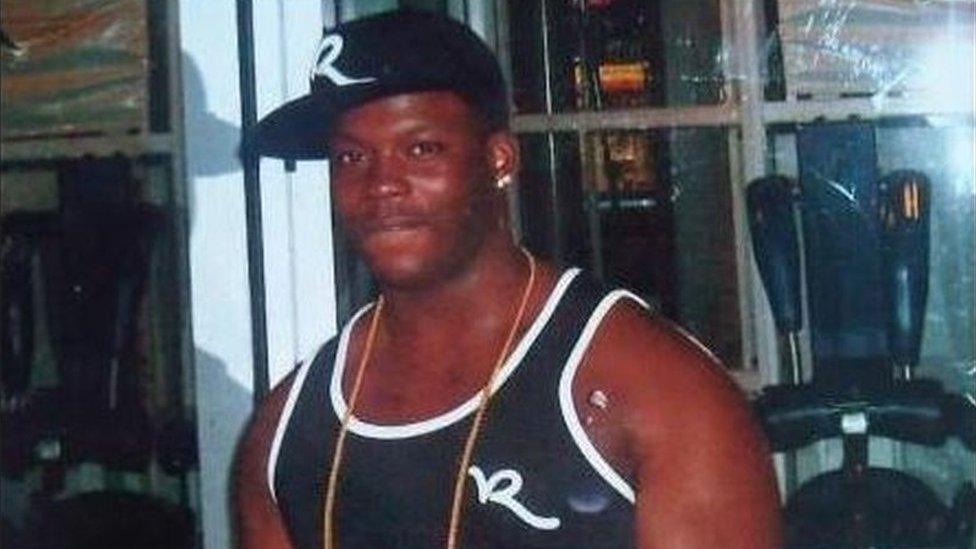
An inquest found prolonged restraint and failure to provide medical help contributed to Kingsley Burrell's death
More than five years after his death in custody, the family of Kingsley Burrell is still waiting to learn if three police officers will face charges. His case has now been taken up by the Black Lives Matter movement. But after years of delays, the family's questions are still the same - just how and why did he die?
Mr Burrell was 29 years old when he died after a cardiac arrest at Queen Elizabeth Hospital in Birmingham. Just four days earlier, he had been sectioned after calling police and claiming two men had put a machine gun to his head.
An inquest into his death concluded prolonged restraint and a failure to provide medical help had contributed to his death. Despite this, no-one has been held responsible.
The case is now being highlighted by the Black Lives Matter movement, with activists joining the family's demonstrations and the US contingent of the campaign group even flying Mr Burrell's sister to the United States to meet other campaigners.
Kadisha Brown-Burrell remembers her older brother as a friendly, quiet, calm man.
"He never raised his voice," the 33-year-old said. "Even as children, when we were all arguing, he wouldn't join in. He was always looking out for us."
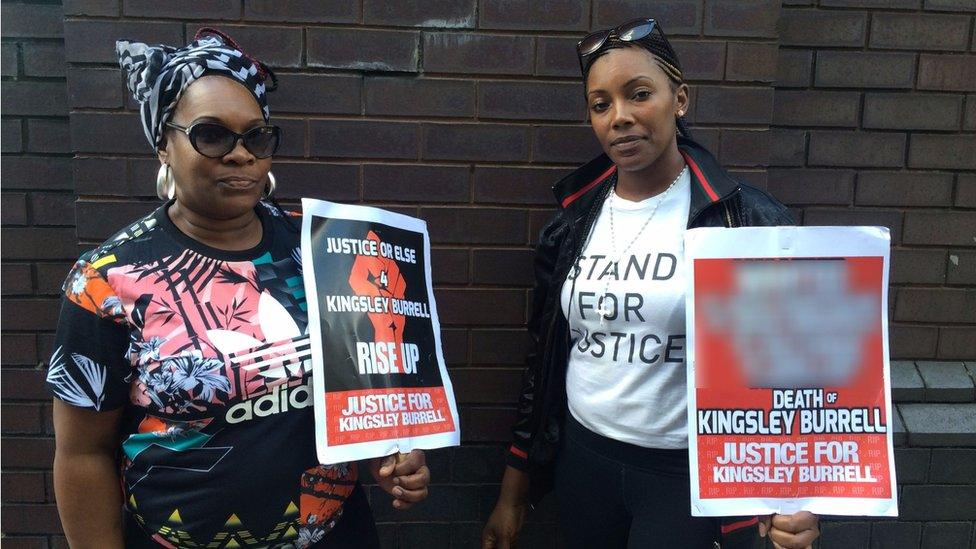
Kingsley Burrell's mother Janet Brown (left) and his sister Kadisha say they will not give up their fight for answers
Her family find it hard to reconcile their memories of Mr Burrell with the police description of the events leading up to his death.
He had dialled 999 from a supermarket in Winson Green, Birmingham, in March 2011, saying he was being threatened by gunmen.
The inquest into his death was told he believed two men were threatening him over a paternity dispute he was involved in with a former girlfriend.
However, when police arrived they decided no firearms offences had taken place and described Mr Burrell as being in an "agitated state".
He was taken to a mental health unit before being moved to hospital.
Inside the ambulance, there was an altercation between officers and Mr Burrell. Officers said he had "gone berserk" and had to be restrained but his family insist he was attacked.
When his sister received a phone call saying he had been restrained under the Mental Health Act she could not believe it.
"It happened on a Sunday, but I'd seen him on the Friday because he was taking my daughter swimming, and there was no sense of anything being wrong," she said.
"Kingsley never, ever, had any mental health issues."
When she visited her brother in hospital, she was shocked by what she saw.
"He couldn't move his head. He had a big lump on his forehead. He said to me 'I can't walk'.
"The handcuffs were on his wrists so tight. I was already going to make a complaint."

Timeline of events
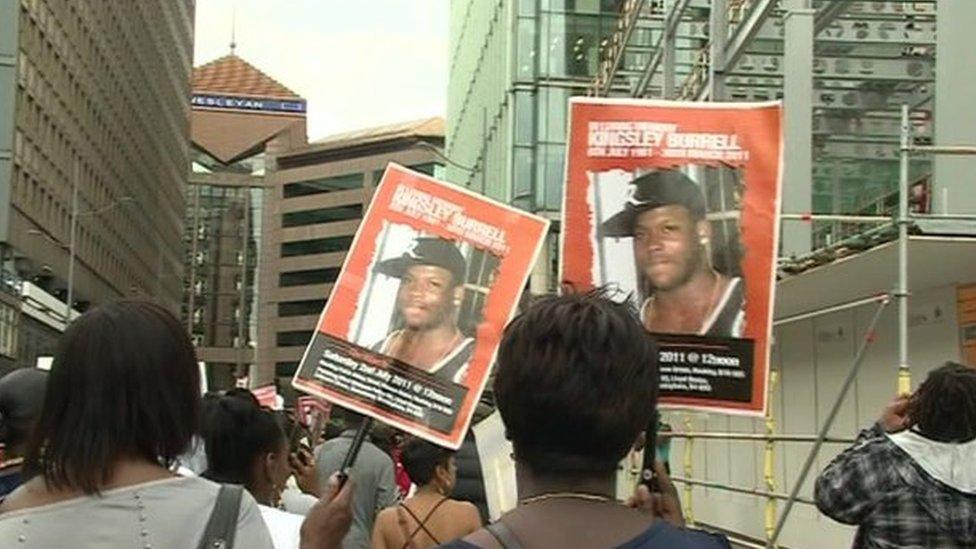
Several demonstrations have been held following Kingsley's death in custody
27 March 2011 - Kingsley Burrell is detained under the Mental Health Act after contacting police
31 March 2011 - Mr Burrell dies in hospital
April 2011 - IPCC launches investigation
August 2012 - Mr Burrell's funeral takes place after his body is released
July 2014 - Prosecutors say there is not enough evidence for charges
May 2015 - An inquest finds restraint was a factor in Mr Burrell's death
October 2015 - The IPCC asks the CPS to review its decision on charges
July 2016 - Mr Burrell's family calls for answer from the CPS
August 2016 - The CPS tells the Burrell family a decision over whether anyone will face charges is imminent

When she visited again, her brother had urinated and had been left on the floor in handcuffs for five or six hours.
Later, she took a phone call to say he had suffered a cardiac arrest.
The inquest jury ruled in 2015 that prolonged restraint had been a factor in Mr Burrell's death, as well as failure to provide basic medical attention. A blanket that was put over his head should have been removed, it added.
Previously, the Crown Prosecution Service had said there was insufficient evidence to bring any charges against four police officers, two ambulance technicians, three nurses and three doctors.
But the inquest's verdict forced a reopening of the investigation. The Independent Police Complaints Commission has also asked prosecutors to consider the family's allegation that police officers had lied under oath.
A decision on that - and the actions of those Mr Burrell was in contact with in the days before his death - is due within weeks.
West Midlands Police said a misconduct hearing was pending against officers and it was co-operating with the IPCC and CPS ahead of the CPS review.
"We should not have had to wait so long," said Ms Brown-Burrell. "There have been systematic failures to deny evidence.
"The whole thing has been very distressing for the whole family but we will not give up our fight.
"It's always the families that are the victims. We know through history that no one ever gets prosecuted in these cases."
The case has now been picked up by the Black Lives Matter campaign, which flew Ms Brown-Burrell to the US in October 2015, along with the relatives of other black British men who died following incidents involving police.
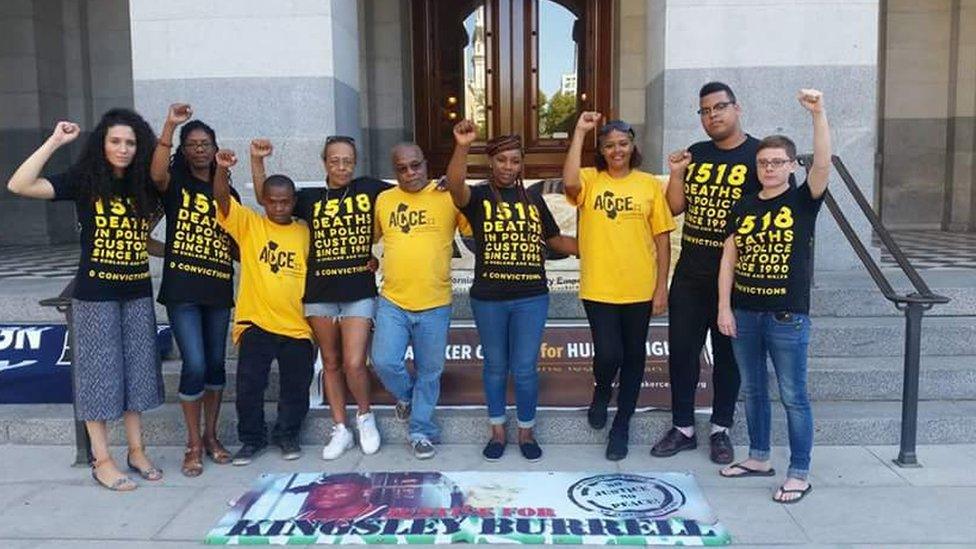
The family's fight has been picked up by the Black Lives Matter campaign in the US
Called the #CaravanForJustice tour, it came in the wake of the Ferguson unrest and other high-profile demonstrations over alleged police brutality.
Among the families the UK contingent met was the uncle of Oscar Grant, external, a 22-year-old African-American man shot in the back by a white officer in 2009. The officer was eventually jailed after what was seen as one of the most racially divisive US trials in recent years.
"It was an intense two weeks, travelling across California sharing our stories," she said.
"It was unbelievable. People couldn't believe that these things were happening in the UK too.
"The trip helped us a lot. They'd heard of Mark Duggan, but they'd never heard the family's stories," said Ms Brown-Burrell.
Back in the UK, campaigners claim that of 1,500 deaths in police custody since 1990, many have been black - and that black people are 37 times more likely to be stopped and searched by the police.
The Black Lives Matter campaign joined the Burrell family in Birmingham on Saturday for their latest demonstration calling for the CPS to reveal if charges will be brought over Mr Burrell's death.
"It just goes to show that we are not alone or suffering in silence," said Ms Brown-Burrell.
"We have to go through as one. If one of us gets a victory, it's a victory for all of us."
- Published8 July 2016
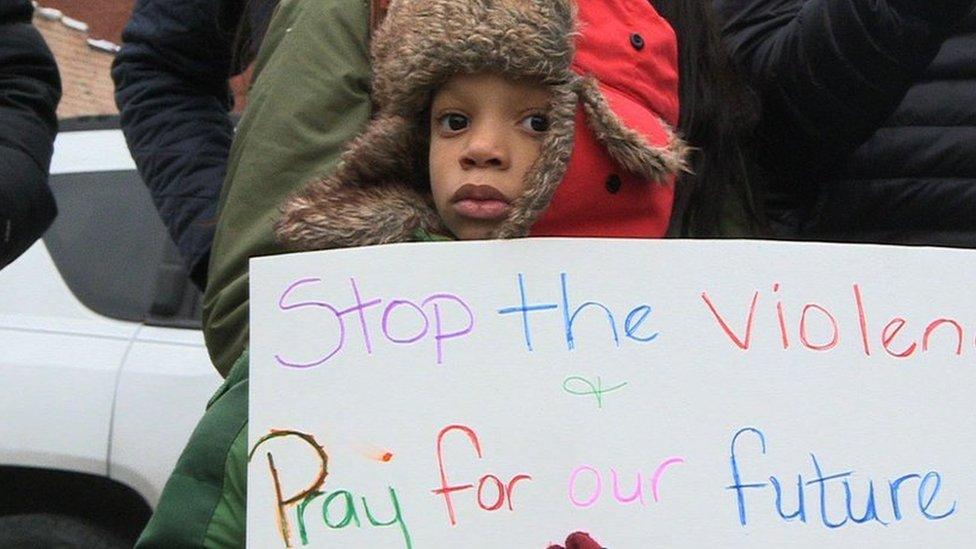
- Published22 October 2015
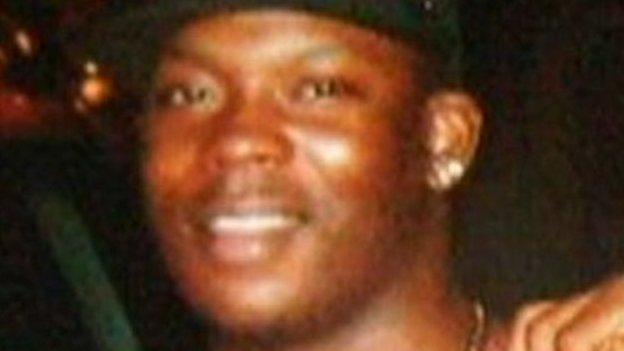
- Published15 May 2015
